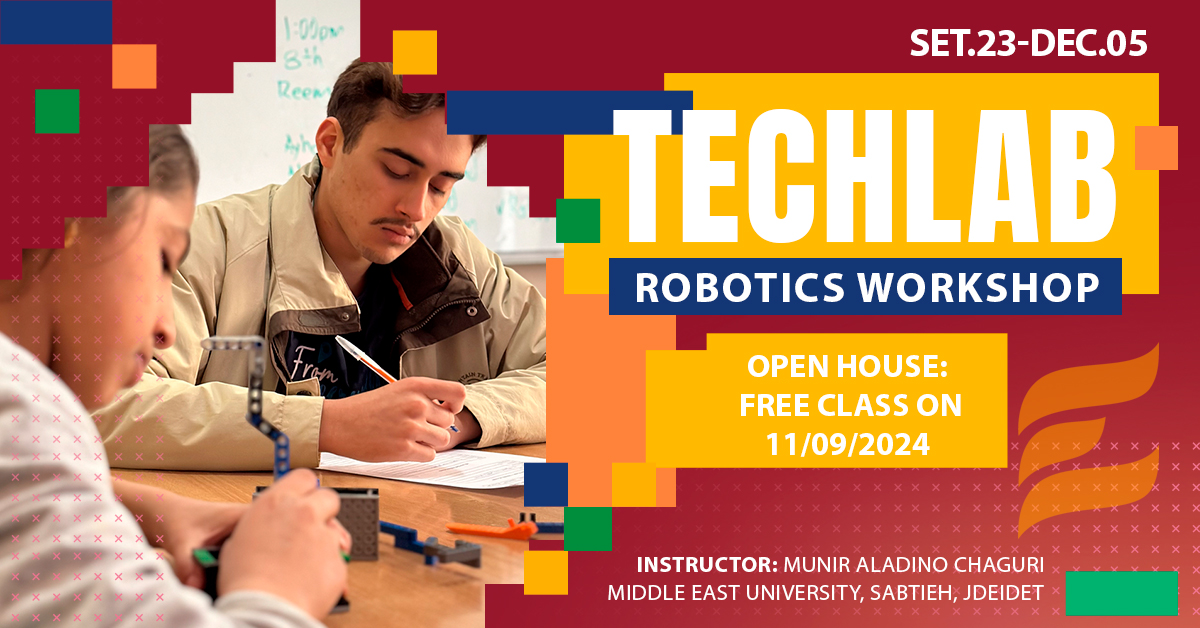
TECHLAB ROBOTICS WORKSHOP
Summer may be over, but the adventure at TechLab is just beginning!
This fall, Middle East University is excited to continue offering our dynamic Robotics workshops for children in grades 1 to 9. Your child can dive into programming, problem-solving, LEGO building, manual arts, technology, and so much more.
Don’t let the end of summer mean the end of innovation—join us at TechLab this semester and watch your child’s creativity and skills soar! Register today and keep the excitement alive!
Register for the Open House using the Google form here https://forms.gle/GEsFXHi7QnVbV3Uu5
Register for fall semester classes using the Google form here https://forms.gle/Uc3PqRhoyfKi6zbz5 or click the link below. Payment is due by the beginning of the class in cash at Middle East University cashier. Do you have questions? Email us at techlab@meu.edu.lb or chat with us at +961 70 389 672

TechLab is an innovative educational workshop that seeks not only to improve children’s essential skills, but also to turn them into active inventors, rather than mere reproducers of knowledge from teaching material. Through hands-on workshops, aided by the STEAM method, we provide an engaging environment where children can explore, learn and grow. Our focus goes beyond the traditional, preparing students for the challenges of the 21st century, in line with UNESCO’s objectives, developing essential competencies and skills for the future.
Students’ classes:
Class 1: Grade 6 – 9
Class 2: Grade 1 – 2
Class 3: Grade 6 – 9
Class 4: Grade 3 – 5
Important dates:
Open House 1: September 11th
Open House 2: September 12th
School starts: September 23rd
End of classes: December 05th
Plans:
Open House (4:30 – 6:30) 09/11/2024 – Free
Open House (4:30 – 6:30) 09/10/2024 – Free
Fall Semester 11 Weeks (Certificate + 21 meetings) From September 23rd to December 05th – USD$150* the Semester.
*You can choose your payment method (installments):
– 1x USD$150
– 2x USD$75
What ‘s Our Goal?
- Stimulate children’s creativity and critical thinking, turning them into active inventors.
- Develop essential skills such as problem-solving, teamwork and communication through practical and collaborative activities.
- Integrating the principles of the STEAM method (Science, Technology, Engineering, Arts and Mathematics) to provide a comprehensive and interdisciplinary approach to learning.
- To encourage students’ curiosity and interest in science and technology, preparing them for the challenges of the 21st century.
- Promote an inspiring and inclusive learning environment where all children feel encouraged to explore, learn and grow.
- Align lesson objectives with UNESCO’s goals, ensuring that students acquire the competencies and skills needed to make a meaningful contribution to an ever-evolving world.
Your Future Career:
- Software Engineer: Skills in programming, problem-solving, and developing interactive projects.
- Data Scientist: Ability to analyze data, use programming tools like Python, and develop data-driven solutions.
- Robotics Engineer: Experience in building and programming robots using LEGO Education and other platforms.
- Product Designer: Competence in design, engineering, and using recyclable materials to create innovative products.
- Digital Artist: Development of creative skills combining art and technology, such as graphic design and digital animation.
- Educational Technology Specialist: Ability to teach and develop STEAM curricula, promoting interdisciplinary education.
- Tech Entrepreneur: Preparation to identify opportunities, develop innovative technological solutions, and launch new businesses.
- Environmental Scientist: Use of scientific and technological skills to solve environmental problems, emphasizing sustainability and the use of recyclable materials.
- Mechanical Engineer: Competence in designing, building, and analyzing mechanical systems and devices.
- Artificial Intelligence Researcher: Knowledge in programming, data analysis, and developing intelligent algorithms.
Essential Skills:
- Critical Thinking: Evaluating complex problems and developing logical, evidence-based solutions.
- Problem-Solving: Identifying challenges and applying practical and creative techniques to solve them.
- Collaboration: Working in teams to achieve common goals, valuing different perspectives and skills.
- Creativity: Exploring and applying innovative ideas in practical and interactive projects.
- Effective Communication: Developing written and oral communication skills, presenting ideas and projects clearly and persuasively.
- Digital Literacy: Using digital technologies, such as programming in Python and building robots, to solve problems and create projects.
- Project Management: Planning, executing, and evaluating projects, tracking progress, and adjusting strategies as needed.
- Interdisciplinary Knowledge: Integrating concepts from science, technology, engineering, arts, and mathematics for a holistic approach to problem-solving.
- Adaptability: Ability to adjust to new information and situations, developing flexible and innovative solutions.
- Empathy and Social Responsibility: Understanding the needs and challenges of the community and developing solutions that positively contribute to society.

